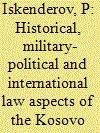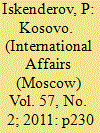| Srl | Item |
| 1 |
ID:
112818


|
|
|
|
|
| Publication |
2012.
|
| Summary/Abstract |
THE YEAR 2011 will be remembered as a period of unprecedented uncertainty in the history of modern Europe. On the one hand, contrary to widespread apocalyptic expectations, the EU did not crumble and the amplitude of the oscillations in the value of the relatively young European currency did stay within tolerable limits. On the other, it is clear that the integrated Europe's worst crash tests are still ahead and that the difficulties confronting the EU are a lot more systemic than circumstantial ...
|
|
|
|
|
|
|
|
|
|
|
|
|
|
|
|
| 2 |
ID:
110093


|
|
|
|
|
| Publication |
2011.
|
| Summary/Abstract |
THE DETERIORATION of the situation in the Serb-populated northern part of Kosovo, paralleled by the deepening of the EU crisis, underscored the inefficiency of the efforts and approaches supposed to help resolve a bitter dispute over Serbia's breakaway province. It became abundantly clear that the attempts made since late 2010 to reach compromise via technical talks between Belgrade and Pristina radicalized both parties to the conflict and put in jeopardy the fragile political balance across the Balkans rather than produced appreciable results. The cause of the problem is that since the late 1990s the U.S. and the EU have been engaging in geopolitical games around Kosovo, considering the province as a proving ground for strategies waiting to be applied on a much wider scale and aimed at putting greater territories with their natural resources and infrastructures under Western control. Due to the complexity of the legacy with which the region is burdened and to the interplay of divergent present-day influences, the West's Kosovo project failed to reach completion, tensions in and over the province became chronic, and the EU saw its already questionable unity in foreign policy and military affairs seriously eroded.
|
|
|
|
|
|
|
|
|
|
|
|
|
|
|
|
| 3 |
ID:
104283


|
|
|
|
|
| Publication |
2011.
|
| Summary/Abstract |
THE ADVISORY OPINION issued by the International Court of Justice last June said that "the declaration of independence on the 17th of February 2008 did not violate general international law"; the Court, however, refused to recognize Kosovo as an international legal subject1 thus driving the Kosovo issue into a legal impasse. The Albanian authorities of Kosovo which looked forward to a prompt international recognition were disappointed: only two UN members (Honduras and Kiribati) joined the countries which had recognized Kosovo's self-proclaimed independence. Today there are 71 of them.2 In an absence of a more or less coherent EU Balkan policy, the contradictions between the Serbs and Albanians can be hardly settled within the framework of its integration models. On the one hand, Brussels accelerates negotiations between Belgrade and Pristina under supervision of Catherine Ashton, High Representative of the Union for Foreign Affairs and Security Policy; on the other, it destabilizes the situation in conflict zones elsewhere.
|
|
|
|
|
|
|
|
|
|
|
|
|
|
|
|